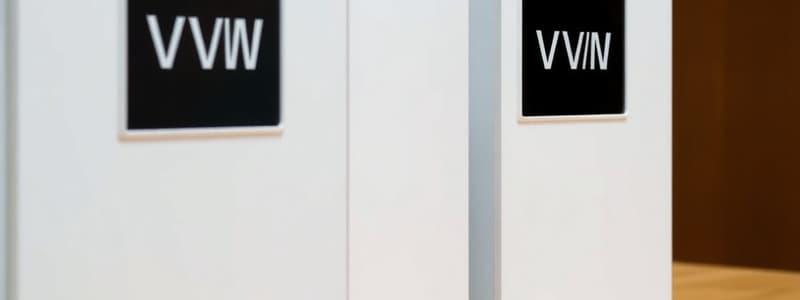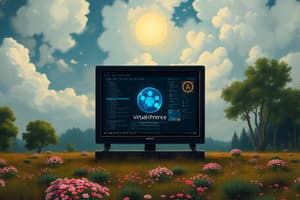Podcast
Questions and Answers
What is the main purpose of cloning a virtual machine (VM)?
What is the main purpose of cloning a virtual machine (VM)?
- To change the VM's operating system
- To create a backup of the original VM
- To create an exact copy of the original VM (correct)
- To upgrade the hardware configuration of the VM
What must be true about the source VM when performing a clone operation?
What must be true about the source VM when performing a clone operation?
- It must be part of a template
- It can be powered on or off (correct)
- It must be managed by VMware Host Client
- It must be powered off
Which software is required to clone a VM?
Which software is required to clone a VM?
- vCenter (correct)
- VMware Host Client
- Microsoft Hyper-V
- Oracle VM Manager
What happens if you use VMware Host Client to manage a host directly?
What happens if you use VMware Host Client to manage a host directly?
Which operation can be performed as an alternative to cloning a VM?
Which operation can be performed as an alternative to cloning a VM?
What does cloning a VM NOT allow you to do?
What does cloning a VM NOT allow you to do?
Which condition is NOT necessary for cloning a VM?
Which condition is NOT necessary for cloning a VM?
What initial step is involved before starting the cloning process?
What initial step is involved before starting the cloning process?
Which method can be used to create a virtual machine using VMware Host Client?
Which method can be used to create a virtual machine using VMware Host Client?
What is a primary consideration when choosing a provisioning method for VMs?
What is a primary consideration when choosing a provisioning method for VMs?
What role do VMware Tools play within a virtual machine?
What role do VMware Tools play within a virtual machine?
When deploying VMs from an OVF template, which of the following sources can you use?
When deploying VMs from an OVF template, which of the following sources can you use?
Which of the following is NOT a lesson outlined in the module?
Which of the following is NOT a lesson outlined in the module?
What is a virtual appliance?
What is a virtual appliance?
What is primarily required for cloning another virtual machine from an existing template?
What is primarily required for cloning another virtual machine from an existing template?
What is the first step in creating and provisioning a new virtual machine?
What is the first step in creating and provisioning a new virtual machine?
What is the main purpose of a local library in a local vCenter environment?
What is the main purpose of a local library in a local vCenter environment?
Which statement is true regarding a subscribed library?
Which statement is true regarding a subscribed library?
What happens to version control information in a content library?
What happens to version control information in a content library?
When creating a local content library, which type can it originate from?
When creating a local content library, which type can it originate from?
Which action can an administrator take regarding a subscribed library?
Which action can an administrator take regarding a subscribed library?
What type of file can be directly mounted from a content library?
What type of file can be directly mounted from a content library?
How can a published library be described?
How can a published library be described?
What limitation exists regarding content in a subscribed library?
What limitation exists regarding content in a subscribed library?
What must be satisfied to use CPU and Memory Hot Plug features in a VM?
What must be satisfied to use CPU and Memory Hot Plug features in a VM?
Which of the following devices can be added to a running VM using hot-plug options?
Which of the following devices can be added to a running VM using hot-plug options?
What is the main limitation when wanting to remove hardware from a VM?
What is the main limitation when wanting to remove hardware from a VM?
Which feature allows for dynamically increasing the size of a virtual disk without powering off the VM?
Which feature allows for dynamically increasing the size of a virtual disk without powering off the VM?
What must be true about the virtual disk in order to increase its size while the VM is powered on?
What must be true about the virtual disk in order to increase its size while the VM is powered on?
What happens if virtual NUMA is configured with virtual CPU hot-plug settings?
What happens if virtual NUMA is configured with virtual CPU hot-plug settings?
Which guest operating systems can benefit from the Memory Hot Plug feature?
Which guest operating systems can benefit from the Memory Hot Plug feature?
What is required to activate hot-plug features in a VM's settings?
What is required to activate hot-plug features in a VM's settings?
Flashcards are hidden until you start studying
Study Notes
Deploying Virtual Machines
- Virtual machines are the foundation of virtual infrastructure.
- Deploying VMs involves:
- Recognizing different types of virtual hardware
- Creating, cloning, and managing VMs and templates
- Modifying VMs
- Updating templates
- Virtual machines can be created via:
- New Virtual Machine wizard (vSphere Client, VMware Host Client)
- Templates or clones (vSphere Client)
- OVF templates (vSphere Client, VMware Host Client)
- Optimal method for provisioning VMs depends on:
- Size and type of infrastructure
- Goals to be achieved
- The New Virtual Machine wizard can be used for single VM creation if existing VMs do not meet requirements.
- A single VM can be used as a template for cloning other VMs.
- Open Virtual Machine Format (OVF) templates are used to deploy VMs, virtual appliances, and vApps.
- Virtual appliances are VMs with preinstalled operating systems and software.
- OVF templates can be deployed from:
- Local file systems
- Removable media
- Shared network drives
- URLs
- Hardware changes to VMs can be made while the VM is powered off or powered on.
Hot-Pluggable Devices
- Hot plug option allows adding resources to a running VM:
- USB controllers
- Ethernet adapters
- Hard disk devices
- CPUs and memory can also be added to VMs with supported guest operating systems.
- Hot-plugging eliminates need for physical interaction with servers.
- To remove hardware, the VM must be shut down, but reconfiguration can be done without entering the data center.
CPU and Memory Hot-Plug
- These features are supported only on guest operating systems with hot-pluggable functionality.
- Features are deactivated by default.
- Requirements for using hot-plug features:
- VMware Tools must be installed
- VM must use hardware version 11 or later
- Guest operating system must support these features
- Hot-plug features must be activated in CPU or Memory settings
- If virtual NUMA is configured with virtual CPU hot-plug settings, the VM starts without virtual NUMA and uses UMA (Uniform Memory Access) instead.
Dynamically Increasing Virtual Disk Size
- The size of a virtual disk can be increased while the VM is powered on.
- The disk must not have snapshots attached.
- System tools may be required to make the new space usable.
- Make appropriate changes to the VM.
Converting a VM to a Template
- Template updates can be performed by converting the template to a VM.
- Changes can be made to the VM after powering it on.
- For security, disconnect the VM from the network or place it on an isolated network during updates.
- After updates, power off the VM and convert it back to a template.
Deploying VMs from a Template
- Requires providing information:
- VM name
- Inventory location
- Host
- Datastore
- Guest operating system customization data
Cloning Virtual Machines
- Cloning creates an exact copy of the original VM.
- Cloning is an alternative to deploying a VM from a template.
- Source VM can be powered on or off.
- Requires connection to vCenter
- Local library is available for use in data centers that are objects to the local vCenter.
- Published library is a local library available for subscription.
- Content library tracks version changes using the vCenter database.
- No option to use previous versions of content.
- Subscribed library is configured to subscribe to a published library.
- Administrator cannot directly change the contents of a subscribed library but can control synchronization to the subscribed library.
Content Library Interface
- Access the content library interface by selecting "Content Libraries" from the main menu.
Creating a Local Content Library
- Select the content library type, for example, Local content library.
- Can mount an ISO file directly from a content library.
Studying That Suits You
Use AI to generate personalized quizzes and flashcards to suit your learning preferences.




